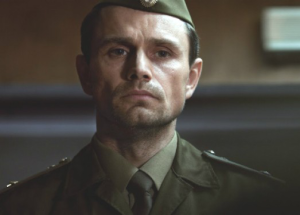
★★★★★
Over 30 years ago, early-warning Soviet satellites detected that the United States had launched a nuclear strike against the Soviet Union. Proper protocol required that the Soviet Union launch a retaliatory strike upon the United States that would start a nuclear war. However, Lt. Col. Stanislav Petrov, a man just filling in for his superior at the Soviet missile command, self-proclaimed as being in the right place at the right time, broke protocol with millions of lives at stake and decided not to retaliate. Without anyone knowing, Petrov had saved the world by correctly guessing that the alerts were a false alarm.
Today, Danish film director Peter Anthony brings Petrov’s story to life with a beautiful hybrid documentary that combines footage of Stanislav in the United States with a dramatization of his past. A film eight years in the making, Anthony’s documentary “The Man Who Saved the World” is both an electric moral tale and a beautifully honest biopic into the life of a hero who fell into loneliness. “The Man Who Saved the World” is a must-see movie that dives into issues as diverse as nuclear armament and estranged families. It is a movie that impressively combines insightful political commentary with a powerful picture of the struggles of the human spirit. This truly is a one-of-a-kind film.
The style and directorial choices made by Anthony construct a beautiful narrative that is scripted impeccably. Instead of having expert narrators who are removed from the event, the documentary is told as a story from Petrov’s perspective. As a result, the movie does not feel like a History Channel documentary; it feels like a cohesive story, scripted to perfection. By using this style, Anthony gives up some honesty in his historical reporting in exchange for an engaging story of unbelievable courage, hope and triumph over tragedy. In this narrative, scenes shift between documentary footage and re-enactment seamlessly, helping to make Petrov a cohesive character that the audience will invest in and feel each of his gut-wrenching looks of loneliness. This is not, however, to diminish the portrayal by Sergey Shnyryov, whose acting is so honest and true to Petrov that it is easy to forget he is not the real Petrov.
The combination of well-captured moments of honest struggle and emotion in the documentary and re-enacted film create a variety of beautiful scenes from seemingly ordinary situations. For instance, while traveling in the United States with his translator, Stanislav gazes upon the rolling hills of South Dakota covered in golden-brown grass and remarks that all it would take is one mistake, and in a second everything would be gone. It then cuts back to the actor’s portrayal of Petrov’s decision to not launch a strike upon America. Throughout the movie, Anthony uses the juxtaposition of the acting and the real to feed off each other and create a beautiful and cohesive narrative.
In addition to the visual choices, the audio of the film deserves great praise. The audio of the movie sets the tone from the very start with sounds of static and a dramatic prelude to a nuclear launch. But the music also complements the visuals such that the music is always heightening the effect of the drama and adding to the intrigue.
But besides cinematographic choices by the director in constructing the movie, the subject matter sheds light on political discussion surrounding nuclear weapons and mutually assured destruction. The movie provides political commentary about the dangers of nukes, but makes it more nuanced than the typical “nukes are bad” cliche by using Petrov’s Soviet perspective to deconstruct the dichotomy between the Soviets and the United States The movie offers significant, nuanced insights into the nuclear age. One particularly fascinating insight is found in Petrov’s interaction with a national park ranger standing above a Minuteman II ICBM. In this interaction, Petrov fiercely argues that the ranger must be wrong that the United States was only preparing for a Soviet first strike because the Soviets were only defending themselves from a U.S. first strike, an event they anticipated because of America’s willingness to use nuclear weapons in World War II. Petrov’s unique insight is a reminder that each nation alienated the other, but neither wanted to be the one to fire the strike that would trigger a nuclear apocalypse. Additionally, Petrov also gives insights into the future possibility of miscalculations and the intentional use of nuclear weapons in the future.
Perhaps even more importantly though, the movie captures Petrov’s personal struggles through his own tragedies, and it is here that the unique narrative style of the movie really comes through at its best. While the political message may get viewers to think, Petrov’s personal struggles will leave eyes watery. In one of the most astute comments of the movie, Petrov’s translator remarks, “You want countries to forgive each other but you cannot even talk to your own mother.” This moment epitomizes what this movie does brilliantly in combining a genuine human story with a larger political issue. The quotation highlights that, hero or not, regardless of his insights, Petrov is still only human, and must fight through his own personal battles.
“The Man Who Saved the World” is one of those rare movies that can make a viewer ponder, laugh and cry all within seconds of each other. The movie brilliantly captures large-scale political issues and intimate human interactions in a tight and coherent narrative. It is an absolute must-watch.
The film will show in the screening room of New South Residence Hall on Feb. 5, 2015 at 7 p.m.














